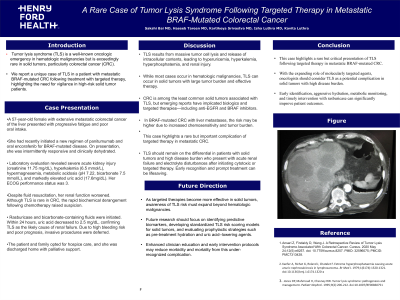Sunday Poster Session
Category: Colon
P0409 - A Rare Case of Tumor Lysis Syndrome Following Targeted Therapy in Metastatic BRAF-Mutated Colorectal Cancer

- SB
Sakshi Bai, MD
Henry Ford Jackson Hospital
Jackson, MI
Presenting Author(s)
1Henry Ford Jackson Hospital, Jackson, MI; 2Monmouth Medical Center, Robert Wood Johnson Medical School of Rutgers University, Long Branch, NJ; 3Jinnah Sindh Medical University, Jackson, MI; 4Danbury Hospital, Jackson, MI; 5Henry Ford Health, Jackson, MI
Introduction: Tumor lysis syndrome (TLS) is a well-known oncologic emergency in hematologic malignancies but is exceedingly rare in solid tumors, particularly colorectal cancer (CRC). We report a unique case of TLS in a patient with metastatic BRAF-mutated CRC following treatment with targeted therapy, highlighting the need for vigilance in high-risk solid tumor patients.
Case Description/Methods:
A 57-year-old female with extensive metastatic colorectal cancer to the liver presented with progressive fatigue and poor oral intake. She had recently initiated a new regimen of panitumumab and oral encorafenib for BRAF-mutated disease. On presentation, she was intermittently responsive and clinically dehydrated. Laboratory evaluation revealed severe acute kidney injury (creatinine 11.75 mg/dL), hyperkalemia (6.5 mmol/L), hypermagnesemia, metabolic acidosis (pH 7.22, bicarbonate 7.5 mmol/L), and markedly elevated uric acid (17.6 mg/dL). Her ECOG performance status was 3.
Despite fluid resuscitation, her renal function worsened. Although TLS is rare in CRC, the rapid biochemical derangement following chemotherapy raised suspicion. Rasburicase and bicarbonate-containing fluids were initiated. Within 24 hours, uric acid decreased to 2.5 mg/dL, confirming TLS as the likely cause of renal failure. Her creatinine was consistently around 11mg/dl for several days immediately started to downtrend post initiation of Rasburicase therapy. Due to poor prognosis, invasive procedures were deferred. The patient opted for hospice care, and was discharged home with palliative support.
Discussion: TLS results from massive tumor cell lysis and release of intracellular contents, leading to hyperuricemia, hyperkalemia, hyperphosphatemia, and renal injury. While most cases occur in hematologic malignancies, TLS can occur in solid tumors with large tumor burden and effective therapy. CRC is among the least common solid tumors associated with TLS, but emerging reports have implicated biologics and targeted therapies—including anti-EGFR and BRAF inhibitors. In BRAF-mutated CRC with liver metastases, the risk may be higher due to increased chemosensitivity and tumor burden.
This case highlights a rare but important complication of targeted therapy in metastatic CRC. TLS should remain on the differential in patients with solid tumors and high disease burden who present with acute renal failure and electrolyte disturbances after initiating cytotoxic or targeted therapy. Early recognition and prompt treatment can be lifesaving.
Disclosures:
Sakshi Bai, MD1, Haseeb Khan Tareen, MD1, Kartikeya Srivastava, MD1, FNU Payal, MD2, Fnu Sagar, MD3, Bipneet Singh, MD1, Manya Kumar, MD4, Kavita Luthra, MD5. P0409 - A Rare Case of Tumor Lysis Syndrome Following Targeted Therapy in Metastatic BRAF-Mutated Colorectal Cancer, ACG 2025 Annual Scientific Meeting Abstracts. Phoenix, AZ: American College of Gastroenterology.
